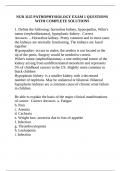NUR 3125 PATHOPHYSIOLOGY EXAM 1 QUESTIONS
WITH COMPLETE SOLUTIONS
1. Define the following: horseshoe kidney, hypospadias, Wilm's
tumor (nephroblastoma), hypoplastic kidney. Correct
Answers ...Horseshoe kidney- Pretty common and in most cases
the kidneys are normally functioning. The kidneys are fused
together
Hypospadias- occurs in males, the urethra is not located at the
tip of the penis. Surgery would be needed to correct.
Wilm's tumor (nephroblastoma)- a rare embryonal tumor of the
kidney arising from undifferentiated mesoderm and represents
5% of childhood cancers in the US. Slightly more common in
black children
Hypoplastic kidney- is a smaller kidney with a decreased
number of nephrons. May be unilateral or bilateral. Bilateral
hypoplastic kidneys are a common cause of chronic renal failure
in children.
Be able to explain the basis of the major clinical manifestations
of cancer. Correct Answers a. Fatigue
b. Pain
c. Anemia
d. Cachexia
e. Weight loss- anorexia due to loss of appetite
f. Infection
g. Thrombocytopenia
h. Leukopenia
i. Infection
,Compare and contrast B and T lymphocytes. Correct Answers
B: immunoglobulin's. Neutralizes pathogens, interacts with
components of inflammation
T: protects against viruses, tumors, pathogens, and essential to
humoral response
Define the following: antigen, immunocyte, antibody, and
immunoglobulin. Correct Answers -Antigen: molecules or
complex of molecules perceived as non-self or foreign and
reacts with component of the immune system. These are on
infectious agents, noninfectious substances in the environment,
on drugs, vaccines, transfusions, or transplanted tissues.
-Immunocyte (Lymphocyte): matured and activated in the
adaptive immune response. It develops during the fetal life in
liver and spleen and in bone marrow in children and adults.
-Immunoglobulin: produced by the plasma or Mature B
lymphocytes- IgG,A,M,D,E
Define the following: hypersensitivity, allergy, autoimmunity,
alloimmunity. Correct Answers a. hypersensitivity: altered
immunologic response to an antigen that results in disease or
damage to the individual . Genetic, infectious and environmental
facts contribute
b. allergy- one of the inappropriate responses that occurs when
the immune system malfunctions
c. autoimmunity:
, Differentiate among the normal distribution of fluids amongst
intracellular, extracellular Correct Answers Intracellular- the
water within our cells and this is where a majority of water is
located
Extracellular- the water not within our cells acts kind of like a
transport mechanism for RBC, proteins, electrolytes etc.
Interstitial- this is a kind of extracellular fluid, it makes up the
fluid in our intestines, cerebral spinal fluid, sweat, tears, urine,
pleural, pericardial, ocular
Intravascular (plasma)- this is also extracellular fluid, the fluid
within our blood
Differentiate between a volatile and non-volatile acids. Correct
Answers Volatile Acids: weak, do not give up H+ easily and are
eliminated via the lungs.
Nonvolatile acids: string, give up H+ easily and are eliminated
via the kidneys
Differentiate between acidosis (acidemia)and alkalosis
(alkalemia). Correct Answers Acidosis: occurs whenever the
pH falls below 7.35 Acidosis is a systemic increase in hydrogen
ion concentration or loss of base. For academia the pH of arterial
blood is less that 7.4
Alkalosis: occurs whenever the PH goes above 7.45 Alkalosis is
a systemic decrease in hydrogen ion concentration or excess of
base. For alkalemia the pH of arterial blood is greater than 7.4




